Related Research Articles

HM Prison Maze was a prison in Northern Ireland that was used to house paramilitary prisoners during the Troubles from August 1971 to September 2000. On 15 October 1974 Irish Republican internees burned 21 of the compounds used to house the internees thereby destroying much of Long Kesh.

A hunger strike is a method of non-violent resistance where participants fast as an act of political protest, usually with the objective of achieving a specific goal, such as a policy change. Most hunger strikers will take liquids but not solid food. Hunger strikers that do not take fluids are named dry hunger strikers.

The 1981 Irish hunger strike was the culmination of a five-year protest during the Troubles by Irish republican prisoners in Northern Ireland. The protest began as the blanket protest in 1976 when the British government withdrew Special Category Status for convicted paramilitary prisoners. In 1978, the dispute escalated into the dirty protest, where prisoners refused to leave their cells to wash and covered the walls of their cells with excrement. In 1980, seven prisoners participated in the first hunger strike, which ended after 53 days.
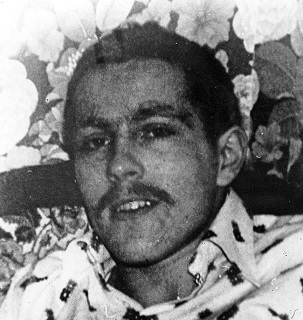
Francis Joseph Sean Hughes was a volunteer in the Provisional Irish Republican Army (IRA) from Bellaghy, County Londonderry, Northern Ireland. Hughes was the most wanted man in Northern Ireland until his arrest following a shoot-out with the British Army in which a British soldier was killed. At his trial, he was sentenced to a total of 83 years' imprisonment; he died during the 1981 Irish hunger strike in HM Prison Maze. Hughes was one of 22 Irish republicans who died on hunger-strike between 1917 and 1981.

Joseph McDonnell was a volunteer in the Provisional Irish Republican Army (IRA) who died during the 1981 Irish hunger strike.
The blanket protest was part of a five-year protest during the Troubles by Provisional Irish Republican Army (IRA) and Irish National Liberation Army (INLA) prisoners held in the Maze prison in Northern Ireland. The republican prisoners' status as political prisoners, known as Special Category Status, had begun to be phased out in 1976. Among other things, this meant that they would now be required to wear prison uniforms like ordinary convicts. The prisoners refused to accept the administrative designation of ordinary criminals, and refused to wear the prison uniform.

The dirty protest was part of a five-year protest during the Troubles by Provisional Irish Republican Army (IRA) and Irish National Liberation Army (INLA) prisoners held in the Maze Prison and a protest at Armagh Women's Prison in Northern Ireland. In March 1978 some prisoners refused to leave their cells to shower or use the lavatory because of attacks by prison officers, and the inmates would later start smearing excrement on the walls of their cells.
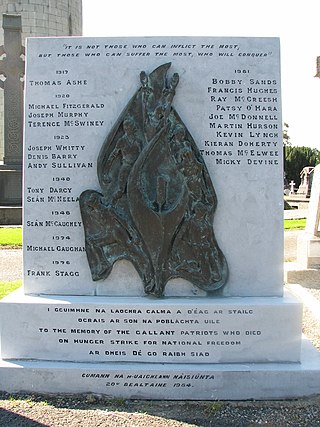
Raymond McCreesh was an Irish volunteer in the South Armagh Brigade of the Provisional Irish Republican Army (IRA). In 1976, he and two other IRA volunteers were captured while attempting to ambush a British Army observation post. McCreesh was one of the ten Irish republicans who died during the 1981 Irish hunger strike in the Maze Prison. McCreesh was one of 22 Irish republicans who died on hunger-strike.
Kevin Lynch was an Irish republican and member of the Irish National Liberation Army (INLA) from Park, County Londonderry, Northern Ireland. The Dungiven hurling team was renamed Kevin Lynch's Hurling Club in his honour after his death on hunger strike.
Michael James "Mickey" Devine was a volunteer in the Irish National Liberation Army (INLA). He was the last hunger striker to die during the 1981 Irish hunger strike.
Matt Devlin was a Provisional Irish Republican Army volunteer who took part in the 1981 Irish hunger strike and was later a leading member of Sinn Féin in County Westmeath, Republic of Ireland.

Brendan Hughes, also known as "The Dark", and "Darkie" was a leading Irish republican and former Officer Commanding (OC) of the Belfast Brigade of the Provisional Irish Republican Army (IRA). He was the leader of the 1980 Irish hunger strike.
Bernard Fox is a former member of the Army Council of the Provisional Irish Republican Army (IRA) who took part in the 1981 Irish hunger strike.
Laurence McKeown is an Irish author, playwright, screenwriter, and former volunteer in the Provisional Irish Republican Army (IRA) who took part in the 1981 Irish hunger strike.
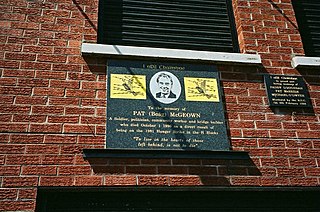
Pat "Beag" McGeown was a volunteer in the Provisional Irish Republican Army (IRA) who took part in the 1981 Irish hunger strike.
Jackie "Teapot" McMullan is a former volunteer in the Provisional Irish Republican Army (IRA) who took part in the 1981 Irish hunger strike.

Hunger is a 2008 historical drama film about the 1981 Irish hunger strike. It was directed by Steve McQueen and starred Michael Fassbender, Liam Cunningham, and Liam McMahon.
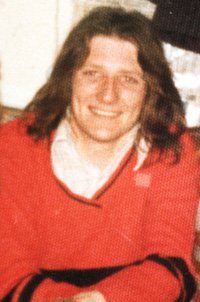
Robert Gerard Sands was a member of the Provisional Irish Republican Army (IRA) who died on hunger strike while imprisoned at HM Prison Maze in Northern Ireland. Sands helped to plan the 1976 Balmoral Furniture Company bombing in Dunmurry, which was followed by a gun battle with the Royal Ulster Constabulary. Sands was arrested while trying to escape and sentenced to 14 years for firearms possession.
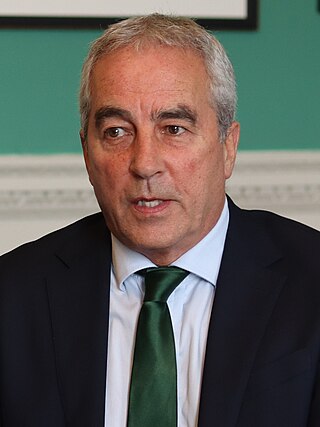
Pat Sheehan is an Irish Sinn Féin politician, and former Provisional Irish Republican Army member and hunger striker at the Maze Prison.
Tom McFeely is an Irish property developer and former member of the Provisional Irish Republican Army. Originally from Dungiven area in County Londonderry, Northern Ireland, McFeely was drawn into the violence that signalled the beginning of the Troubles in 1969 and would soon become a member of the Provisional IRA. Following a period of living life on the run, McFeely was captured and imprisoned after he and an accomplice robbed a post office in the mid-1970s. McFeely was sent to HM Prison Maze where he took on a leadership role amongst other imprisoned IRA men. In 1980 McFeely led seven IRA men on a hunger strike in protest against the revoking of special status for political prisoners, ultimately surviving for 53 days without food until the strike was called off by IRA leadership. In 1986 McFeely was amongst a number of Irish republicans who split from the Provisional IRA and Sinn Féin over their recognition of the legitimacy of Dáil Éireann. He subsequently founded the League of Communist Republicans alongside fellow inmate Tommy McKearney.
References
- ↑ Irish Hunger Strikes Chapter 41 Archived 2003-03-29 at archive.today
- ↑ Two Lives and Two Deaths for Ireland Archived 2003-03-10 at archive.today
- ↑ Guardian
- 1 2 Melanie McFadyean (4 March 2006). "The legacy of the hunger strikes". The Guardian . Retrieved 4 May 2024.
- ↑ "Hunger striker revisits the day his life changed forever". Antrim Guardian. Alpha Newspaper Group. 14 May 2021. Retrieved 6 May 2023.
- ↑ "Patrick Quinn, the IRA hunger striker whose life was...". United Press International. 15 August 1981.
- ↑ 1981 Hunger Strike Survivors Archived 2006-12-16 at the Wayback Machine .
- ↑ The legacy of the hunger strikes Archived 2007-10-05 at the Wayback Machine
- ↑ "MESSAGES FROM A HUNGER STRIKE (Published 1989)". The New York Times .
- ↑ Timewatch - Hunger Strike: A Hidden History (Otmoor Productions/BBC, 1993.)
- ↑ Hunger Strike: A Hidden History film
- ↑ Paddy Quinn – via YouTube.